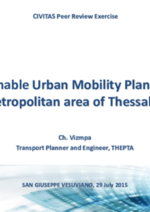
Image by Dimitra Kartsakli
Thessaloniki (Greece)
With a population of around 1 million, Thessaloniki is the capital of the region of Macedonia. It is a major economic, industrial, commercial, and political center and an important transportation hub. Thessaloniki is the second-largest city in Greece, acting as an innovation and development hub. In 2021, Thessaloniki adopted its Sustainable Urban Mobility Plan (SUMP), with the following vision “Entrepreneurship and cultural heritage of Thessaloniki city are supported and promoted in a vibrant, resilient and functional urban environment for both residents and visitors, in which everyone can easily travel by combined alternative transport modes enjoying the open seafront and green public spaces”.
The strategy of the city, according to SUMP, is to promote the pedestrians’ movement, through the redistribution of public space, to develop tourists/ pedestrian routes and low traffic areas, as well as organize the city logistics by using alternative means of transport to upgrade the urban environment and reduce GHG pollutants. Thessaloniki acts as a large-scale ITS testbed for the implementation of cooperative mobility services.
Additionally, Thessaloniki’s planning promotes multimodality and the infrastructure of new modes through the development of multimodality hubs and stations for electric car and bike-sharing. The deployment of a city-wide MaaS scheme, including public transport and shared mobility services, is part of the vision of the city.
Thessaloniki Smart Mobility Living Lab is operating in the city, following an ecosystem approach to develop techniques for collecting, managing, and validating data from multiple sources.
Get to know more about the City's Mobility Plan here.
Fast Facts
325,182
Population
19.307 km²
City area





















